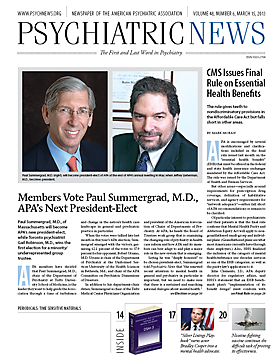The Senate Health, Education, Labor, and Pensions (HELP) Committee, convened a meeting January 24 to discuss—for the first time in six years—the mental health of Americans. Prompted by the Newtown, Conn., school shooting and in anticipation of the changes the Affordable Care Act will bring about, committee members solicited input at the hearing they dubbed “Assessing the State of America’s Mental Health System.”
“It seems to me that the questions before us are ‘who needs help’ and ‘who’s there to provide the help’,” said Sen. Lamar Alexander (R-Tenn.), the committee’s ranking member.
Pamela Hyde, J.D., administrator of the Substance Abuse and Mental Health Services Administration (SAMHSA), was the first to provide testimony. “Behavioral health is a public-health issue, not a social issue, and it can be tackled and addressed with an effective public-health approach,” she said, while noting that SAMHSA’s National Survey on Drug Use and Health indicates that only 38 percent of adults with diagnosable mental health problems and only 11 percent of those with diagnosable substance use disorders receive treatment.
“Prevention works, treatment is effective, and people do, in fact, recover,” she stressed, but obstacles including cost, access, and recognition of mental health disorders are the primary reasons treatment is not received by many who need it.
Hyde pointed to upcoming changes associated with the Affordable Care Act that will extend the reach of mental health treatment to more Americans, saying “Medicaid is already the largest payer of mental health services, and the Affordable Care Act will extend Medicaid coverage to as many as 17 million hardworking Americans.”
Thomas Insel, M.D., director of the National Institute of Mental Health (NIMH), also presented testimony and emphasized that most mental disorders begin early in life, yet patients often wait years for diagnosis and treatment. “The lesson we have learned from cancer and heart disease, diabetes and AIDS, is that the secret to having the best outcomes is early detection and early intervention…yet we don’t do that.”
Moving forward, NIMH will support research on earlier diagnosis and quicker delivery of appropriate treatment, be it behavioral or pharmacological, he said.
Medical Director James H. Scully Jr., M.D., submitted testimony on behalf of APA. “This hearing comes at a critical time when our leaders in government are faced with difficult choices about where to allocate limited resources,” he noted. “Nevertheless, I believe the current state of our nation’s mental health system is weak and demands immediate and significant attention by Congress and the administration.” Scully’s testimony presented five key areas through which the mental health system could be strengthened to ensure the mental health and well-being of all Americans:
Mental Health Parity. APA urges issuance of a final rule on the Mental Health Parity and Addiction Equity Act of 2008. In the absence of a final rule, APA is concerned that access to critical mental health services will be jeopardized for millions of Americans. APA also supports reintroduction of the Medicare Mental Health Inpatient Equity Act, which would increase access to coverage for the most seriously mentally ill people.
A Commission on Mental Health. APA supports the idea of a new commission—either presidential or congressional—to conceptualize how the nation’s mental health system can meet the needs of all Americans.
Investing in Existing Mental Health System Components. APA supports investment in biomedical research, initiatives to develop and implement new treatments for addiction, and state block grants for mental health and substance use activities, suicide prevention, and jail-diversion programs for people with mental illness.
Support for Graduate Medical Education. The ability of the U.S. mental health system to deliver high-quality care in a coordinated and cost-effective manner is dependent upon an appropriately trained workforce. As a physician specialty society, APA strongly supports the preservation of funding for both direct graduate medical education and indirect graduate medical education, programs that support 16,000 residencies each year.
Early Intervention and Prevention Services for Youth. As a vulnerable population, children and adolescents are especially in need of early intervention and prevention services.
Scully also brought to the committee’s attention the initiative APA launched through the American Psychiatric Foundation, called “Typical or Troubled?,” to train school personnel to make the distinction between students who are “just being adolescents” and students who demonstrate early signs of mental illness, saying “this program represents the type of early intervention and prevention strategy that could serve as a national model.” ■
